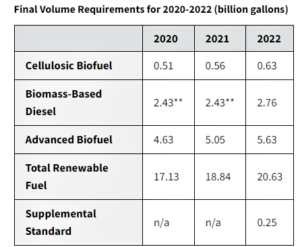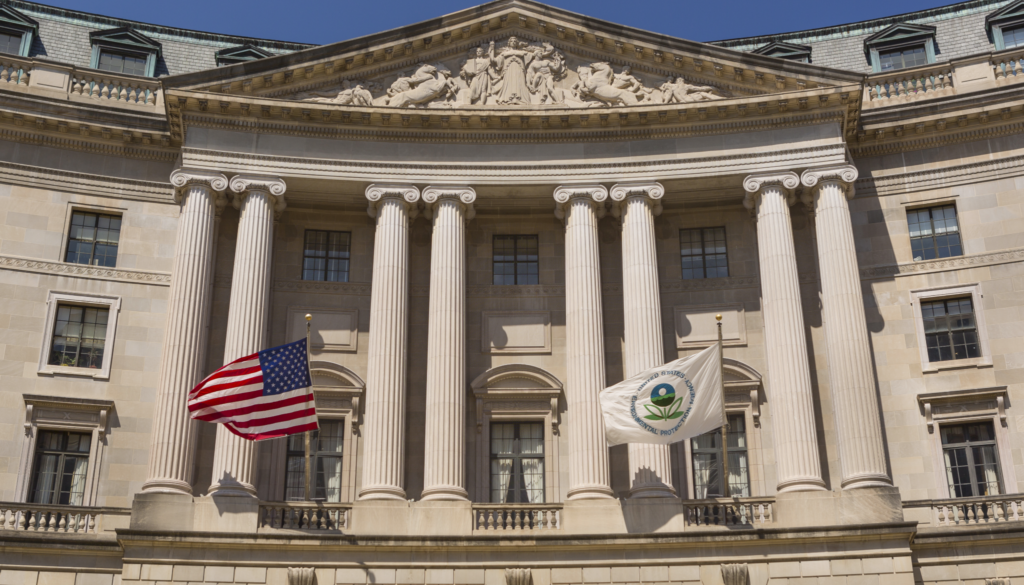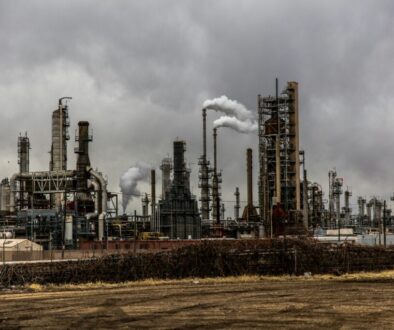EPA’s biofuel targets are not achievable, refiners say
The Environmental Protection Agency’s (EPA) new biofuels production targets announced last week are unachievable and “bewildering” given already high fuel costs, according to leading refinery industry players.
In the renewable fuel standard (RFS) rule unveiled on Friday, the EPA established a total renewable fuel goal for 2022 at 20.63 billion gallons. The agency also set a cellulosic biofuel goal at 0.63 billion gallons; a goal for biomass-based diesel at 2.76 billion gallons; and an advanced biofuel goal at 5.63 billion gallons.
The agency also announced a “supplemental” 250 million gallon goal, and said it intends to issue another such supplement in 2023, which will further hike the overall targets.

The EPA’s action is “bewildering and contrary to the Administration’s claims to be doing everything in their power to provide relief to consumers,” American Fuel & Petrochemical Manufacturers (AFPM) President and CEO Chet Thompson said in a statement. “Unachievable mandates will needlessly raise fuel production costs and further threaten the viability of U.S. small refineries, both at the expense of consumers. The Administration missed a prime opportunity to provide relief and will have no one to blame for this but themselves.”
The EPA not only set production goals for 2022 but also adjusted its 2021 targets to reflect the drop in fuel demand during the coronavirus pandemic. The rule includes other provisions, such as a new program to make it easier for other types of biofuels to qualify under the RFS.
The final rule makes only slight adjustments to the 2022 biofuels targets compared to the proposed numbers that the agency floated in December.
EPA Administrator Michael Regan said the new goals would give consumers more options.
“At EPA, we are laser-focused on providing more options for consumers at the pump, and today we are taking steps to increase the availability of homegrown biofuels,” Regan said in a statement.
Congress created the RFS in 2005 to reduce dependence on foreign oil, lower greenhouse gases (GHGs) and boost U.S. renewable fuels.
AFPM’s criticisms echo its remarks to EPA and White House officials ahead of the rule’s release, in which the group urged the agency to significantly lower the biofuels production targets. AFPM warned that the high goals were unachievable, would impose major costs on refiners, and would exacerbate already widespread and growing fuel costs and supply shortages.
In meetings with the Biden administration, the American Petroleum Institute (API) similarly urged lower targets, arguing that the EPA risked exacerbating current market challenges by placing additional pressures and restrictions on refiners and fuel blenders.
The targets “exceed EPA’s own estimates of what the market can absorb and are likely to place additional pressure on refiners that are already running full throttle to keep pace with demand,” API Vice President of Downstream Policy Ron Chittim said in a statement.
Biofuels supporters disagree, and they largely welcomed the 2022 RFS, saying that it would help to encourage further growth in the U.S. renewable fuels industry.
“At long last, the RFS is being put back on track,” Geoff Cooper, president and CEO of the Renewable Fuels Association, said in a statement. Cooper’s group met with EPA and White House officials ahead of the rule’s release, and he said the final goals put the program “on solid footing for the future.”
In a separate statement, Emily Skor, CEO of pro-ethanol advocacy group Growth Energy, said: “These last six months have been a rude awakening for those who have grown complacent about U.S. energy supplies. EPA’s 2022 renewable fuel blending requirements will deliver savings at the pump for working families, slash carbon emissions, and strengthen U.S. energy security by bringing more American renewable fuel into our fuel supply.”
Skor said 15-percent ethanol fuel has “been a shield against skyrocketing fuel prices” in recent months, claiming it saved drivers about $0.60 per gallon in some locations, while overall biofuels produced in the U.S. reduced GHGs by roughly 46 percent over conventional gasoline.
 EWG
EWG


